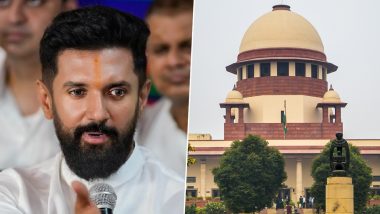Patna, August 3: Union minister Chirag Paswan on Saturday opposed the Supreme Court judgement allowing states to create sub-groups within Scheduled Castes for a slice of the 15 per cent quota, and declared that his Lok Janshakti Party (Ram Vilas) will appeal against it. Addressing a press conference here, Paswan said he was in favour of a caste census, for which a vociferous demand is being made by the Leader of the Opposition Rahul Gandhi, though he was also of the view that findings thereof "must not be made public".
"Our party will go for an appeal requesting the apex court to review its recent judgement allowing sub-groups within 15 per SC quota," he said. "Creamy layer cannot be allowed in SC quota. Allowing sub-groups within SC quota will not serve the purpose of uplifting the socially marginalised segment that has been a victim of the practice of untouchability," he added. The Hajipur MP, whose late father Ram Vilas Paswan was among the tallest Dalit leaders of the country, expressed surprise that "the word untouchability does not even find a mention in the apex court judgement". Supreme Court Verdict on Sub-Classifications in SC, ST Categories: India’s Top Court Opines on Identifying Creamy Layer in Scheduled Castes and Scheduled Tribes, Justice Gavai Suggests Policy.
"The majority of Scheduled Caste people, even those coming from well-to-do families and having access to education, face untouchability. Therefore, allowing sub-groups within SC is not justified," he said. Paswan, however, refused to comment on the stand taken by his alliance partner JD(U) over the issue, which has hailed the verdict as a "vindication" of policies of Chief Minister Nitish Kumar who had years ago created the "Mahadalit" category in the state. Supreme Court Allows Sub-Classification of SC, ST for Reservation in Majority Verdict.
He was also asked about the demand for a caste census which has of late rocked Parliament. "I think we should have a caste census. But findings of the same must not be made public. The data collated should be used by the government for framing policies," added Paswan, without elaborating further.













 Quickly
Quickly





















